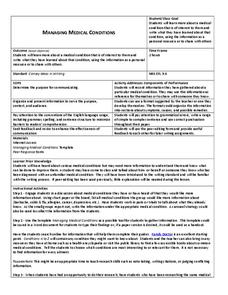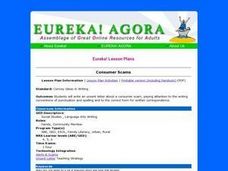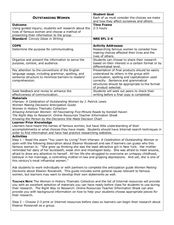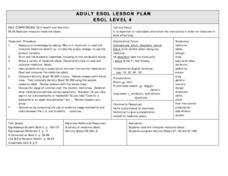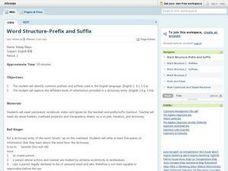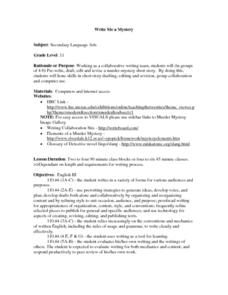Curated OER
Managing Medical Conditions
Your scholoars practice organizing and presenting information through written language. They gather information about a medical condition and share it with someone else. They then use a format where they organize their information using...
Curated OER
Regions of the United States
Your learners practice writing ideas on paper and logically presenting them in an organized manner. They brainstorm ways to write down ideas while creating a travelogue about a particular U.S. geographic region. When they present...
Curated OER
Convey Ideas in Writing
Use the platforms of the 2004 presidential candidates to bring persuasive writing to your class. Young voters identify the three issues most important to them in the election and research the issues and candidates' positions. They write...
Curated OER
Outstanding Women
Research the lives of famous women in this social studies lesson. Middle schoolers use various sources to research a famous woman and create a presentation about the accomplishments of the woman. They can find the central idea throughout...
Curated OER
What Are the Issues?
Investigate and report on three issues related to a current election. Elementary aged learners research information about specific issues, develop an opinion, and write a persuasive essay using supporting details and evidence to support...
Curated OER
Amos and Boris: Text Study
Twenty insightful questions follow a read aloud of the story, Amos and Boris by William Steig. Scholars then show what they know through completion of a cause and effect chart, reading fluency assessment, and a written...
Curated OER
Unit 7: Family Celebrations - Day Three: Describing Pets
English language learners examine advertisements for pets and pet shelters. Students read advertisements about pets who are living in shelters. They answer comprehension questions based on the reading before writing an original...
Curated OER
When Is a Noun a Verb? Examining Double Duty Words
The New York Times' Learning Network provides great lessons! This one uses articles from the paper to help readers understand homonyms like mail (verb and noun). It also includes an exercise in reading informational text. Links to the...
Curated OER
When is a Noun a Verb? Examining Double Duty Words
Act and act, address and address...there are so many words in our dictionary that can function as nouns or verbs. Start this lesson plan by having your class list as many as they possibly can. When an adequate list presents itself, have...
Curated OER
Moving With Your Roots
Students dissect common words to study the origins of those words. In this language arts lesson, students study the Greek and Latin roots found in many words within English language. Students use dictionaries to fill out worksheets...
Curated OER
Conventions Self-Check Sheet
Fifth graders study conventions in writing. In this grammar lesson, 5th graders listen to samples with appropriate conventions and samples without appropriate grammar and determine which are appropriate. Students self-assess their...
Curated OER
Which Medicine To Take?
Students demonstrate the appropriate way to read a medicine label. They read and interpret dosing instructions for both prescription and over the counter medications. Students discuss the usage of over the counter medications based on...
Curated OER
Proofreading Practice
In this proofreading practice online worksheet, 6th graders retype three passages correcting errors in spelling, punctuation, capitalization, grammar and usage, with answers available.
Curated OER
Proofreading Activity
in this proofreading worksheet, students read a set of passages and rewrite, correcting errors in spelling, punctuation, capitalization, grammar and usage.
Curated OER
Word Structure-Prefix and Suffix
Young scholars identify the common prefixes and suffixes used in the English language. They dissect a word into its various (root, prefix, suffix) parts and use a dictionary to determine the proper usage and derivation of each word...
Curated OER
Write Me a Mystery
Eleventh graders, in groups, pre-write, draft, edit and revise a murder mystery short story to hone their skills in short story drafting, editing and revision, group collaboration and computer usage. They also evaluate writing for both...
Curated OER
Adjectives
In this grammar activity, 3rd graders focus on the usage of adjectives. Students read 10 sentences and complete multiple choice questions choosing the best adjective to describe the underlined noun in each sentence.
Curated OER
Proofreading Relay
Sixth graders play a proofreading relay game. In this proofreading lesson, 6th graders are broken up into two teams. Each team has an incorrect sentence and they need to fix it one at time by checking for mistakes in grammar,...
Curated OER
Do and Does - Health ELL
In this do and does ELL learning exercise, students learn the correct usage for the words do and does by reading the conversation and filling in the blanks with do, does, doesn't, or don't.
Curated OER
What's Happening?
Students participate in a grammar game. They identify verbs, adverbs and phrases. They complete a quiz at the end of the lesson plan to determine how much practice they still need.
Curated OER
How do we write a report?
Learners write a report on a word processing program. In this report lesson, students write about what qualities a hero possesses. They type it on a word processing program and proofread for spelling, grammar, punctuation and more.
Curated OER
Affect vs. Effect Quiz
In this affect versus effect usage learning exercise, students complete an 11 question on-line quiz. They choose the sentence in each example that includes the proper usage of the word affect or effect. They check their answers on-line.
Curated OER
Simple Past: Negatives
In this online/interactive past tense negative verbs worksheet, students read sentences with present tense verbs, change the verbs to negative past tenses, check, show a letter, and show answers. Students write 5 answers.
Curated OER
Adjectives and Adverbs: Bad and Badly
In this adjectives and adverbs worksheet, students learn the correct use of "bad" and "badly". Students correct the word usage in 10 sentences.


